Memory keeping is a powerful stress-reliever that lets you creatively preserve cherished moments while finding calm. As you engage in scrapbooking, journaling, or digital collections, you're focusing on positive memories and expressing yourself artistically. This mindful practice helps you process emotions, organize thoughts, and gain a sense of accomplishment. You'll discover personal growth through self-reflection and storytelling, all while distracting yourself from anxious thoughts. The tactile nature of crafting materials can be grounding, and the act of preserving memories fosters gratitude. By exploring memory keeping, you'll reveal a wealth of emotional benefits and stress-reducing techniques.
Preserving Positive Moments

Why do we often forget the little moments that bring us joy? In the hustle of daily life, it's easy to let those precious memories slip away. That's where memory keeping comes in as a powerful tool to preserve positive experiences.
When you engage in memory keeping, you're actively choosing which moments to highlight and remember. This process helps you focus on the good times, reinforcing positive emotions and gratitude. You'll find yourself more attuned to life's simple pleasures, knowing you'll want to document them later.
Memory keeping can take many forms: scrapbooking, journaling, photo albums, or digital collections. As you create these tangible reminders, you're not just preserving memories; you're also processing and internalizing them.
This reflection can boost your mood and provide comfort during challenging times.
Creative Expression and Relaxation
Memory keeping isn't just about preserving moments; it's also a wonderful outlet for creative expression and relaxation. As you engage in this hobby, you'll find numerous ways to release your creativity and unwind from daily stresses.
Scrapbooking, for instance, allows you to experiment with various layouts, colors, and embellishments. You can mix and match papers, stickers, and photographs to create unique pages that reflect your personal style.
Journaling offers a chance to express your thoughts and feelings through words, doodles, or even poetry.
Digital memory keeping opens up a world of possibilities with photo editing, graphic design, and digital storytelling. You can create stunning photo collages, design custom photo books, or craft multimedia presentations of your memories.
The process of memory keeping itself is inherently relaxing. As you sort through photos, reminisce about past events, and craft your projects, you'll find yourself immersed in a calming, meditative state.
This focused attention on positive memories can help reduce stress and anxiety, allowing you to recharge and refocus.
Mindful Focus on Happy Memories
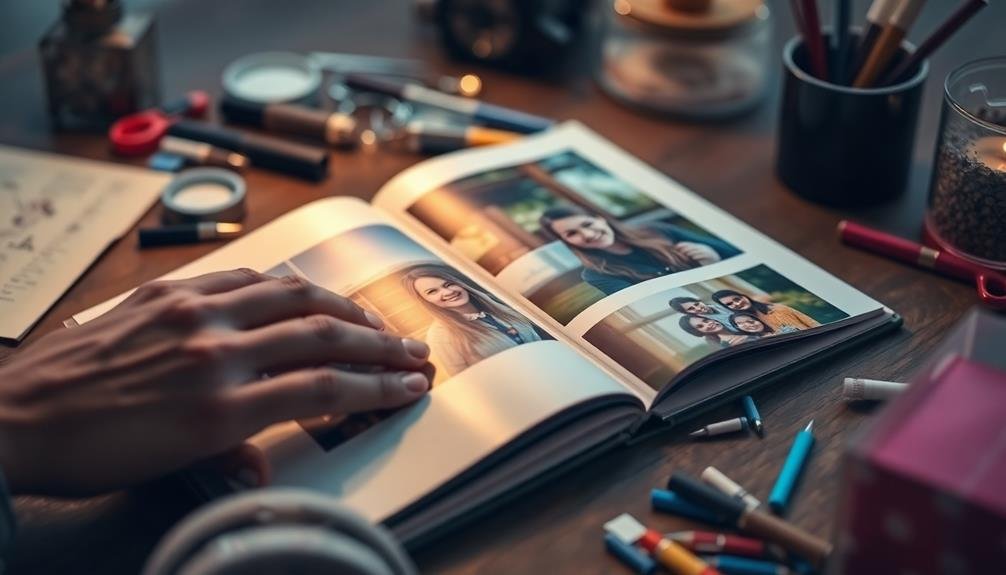
One of the most powerful aspects of memory keeping is its ability to shift your focus towards positive experiences. As you engage in this hobby, you're actively choosing to relive and celebrate joyful moments from your past. This mindful practice can greatly improve your mood and overall outlook on life.
When you're scrapbooking, journaling, or creating photo albums, you're not just passively remembering; you're actively engaging with your memories. This process encourages you to:
- Reflect on the details of happy events
- Appreciate the growth and changes in your life
- Recognize the positive relationships and experiences you've had
Therapeutic Journaling Through Scrapbooking
Scrapbooking offers a unique form of therapeutic journaling that combines visual and written elements. As you create pages filled with photos, mementos, and written reflections, you're engaging in a powerful form of self-expression and emotional processing. This creative outlet allows you to explore your thoughts and feelings in a tangible, multi-dimensional way.
When you scrapbook, you're not just preserving memories; you're actively reflecting on them. You'll find yourself naturally jotting down thoughts and emotions associated with each photo or memento. This process can help you gain new perspectives on past events and work through unresolved feelings.
The act of arranging elements on a page can be meditative, allowing you to focus on the present moment while connecting with your past. You'll often discover patterns in your experiences or uncover forgotten details as you curate your memories. This can lead to valuable insights about your personal growth and life journey.
Scrapbooking also provides a safe space to express difficult emotions. You can create pages dedicated to processing grief, celebrating personal triumphs, or exploring complex feelings. This visual journaling technique can be especially helpful when words alone feel inadequate to express your experiences.
Organizing Thoughts and Experiences
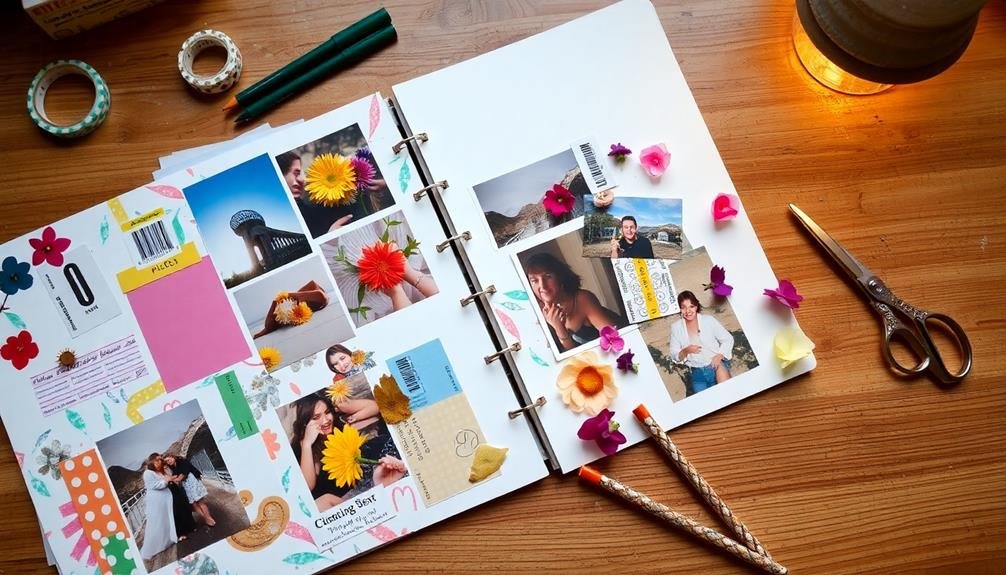
Clarity emerges from chaos when you use memory keeping to organize your thoughts and experiences. By creating a tangible record of your life's events, you're able to sort through complex emotions and gain perspective on your journey. This process allows you to identify patterns, track personal growth, and make connections between seemingly unrelated occurrences.
As you engage in memory keeping, you'll find that it naturally lends itself to organizing your thoughts and experiences in a structured manner. This organization can take various forms, such as:
- Chronological timelines
- Thematic collections
- Emotional color-coding systems
By implementing these organizational methods, you're not only preserving memories but also creating a roadmap of your personal history. This structured approach helps you navigate your past experiences more effectively, allowing you to learn from them and apply those lessons to your present and future.
Moreover, the act of organizing your thoughts and experiences through memory keeping can lead to improved mental clarity and reduced stress. As you externalize your internal world, you're freeing up mental space and creating a sense of order in your life.
Gratitude Practice in Memory Keeping
How can incorporating gratitude into your memory keeping practice enrich your life? By focusing on the positive aspects of your experiences, you'll cultivate a more optimistic outlook and reduce stress. Gratitude practice in memory keeping involves regularly documenting things you're thankful for, big or small.
You can integrate gratitude into your memory keeping through various methods:
| Gratitude Method | Description |
|---|---|
| Daily journaling | Write three things you're grateful for each day |
| Photo challenges | Capture and document one grateful moment daily |
| Gratitude jar | Fill a jar with notes about positive experiences |
| Thankful letters | Write and preserve letters of appreciation to others |
| Gratitude scrapbook | Create themed pages highlighting life's blessings |
By consistently practicing gratitude in your memory keeping, you'll:
- Improve your mental health
- Enhance your relationships
- Boost your self-esteem
- Increase your resilience to stress
Stress Reduction Through Crafting
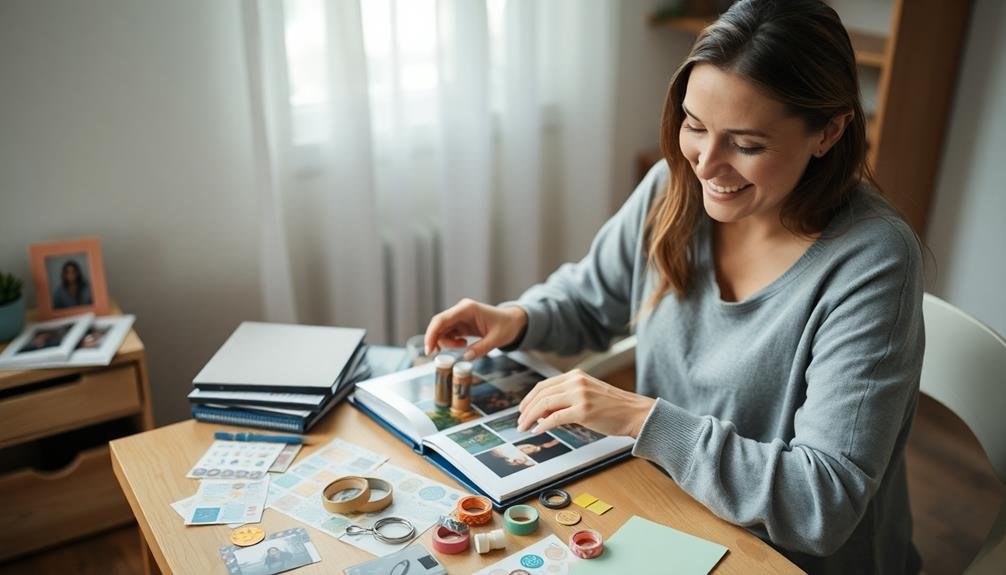
Through the act of crafting, you can greatly reduce stress and improve your overall well-being.
Memory keeping, as a form of crafting, offers a unique opportunity to engage in a mindful activity that promotes relaxation and emotional processing. When you're focused on creating scrapbooks, photo albums, or journaling, you're allowing your mind to shift away from daily stressors and into a state of flow.
The repetitive motions involved in crafting, such as cutting paper or arranging elements, can have a meditative effect, helping to calm your nervous system. Additionally, the sense of accomplishment you feel when completing a project boosts your self-esteem and provides a positive emotional outlet.
Here are three ways memory keeping can help reduce stress:
- Encourages mindfulness and present-moment awareness
- Provides a creative outlet for self-expression
- Offers a sense of control and order in a chaotic world
Social Connections and Shared Memories
Fostering social connections, memory keeping provides a unique platform for sharing and preserving collective experiences. When you engage in this hobby, you're not just documenting your own life; you're creating a tapestry of shared moments with friends and family.
By organizing scrapbooking sessions or digital album creation parties, you'll strengthen bonds and create new memories while preserving old ones.
You'll find that memory keeping often sparks conversations and laughter as you reminisce about past events. It's a chance to relive happy moments and process difficult ones together. As you collaborate on projects, you'll gain new perspectives on shared experiences and deepen your understanding of loved ones' viewpoints.
Memory keeping also bridges generational gaps. When you involve older family members in your projects, you're preserving family history and traditions.
Younger generations benefit from these stories, gaining a sense of identity and connection to their roots. By sharing your creations online or through social media, you'll extend your social circle, connecting with like-minded enthusiasts who share your passion for preserving memories.
Sense of Accomplishment and Purpose
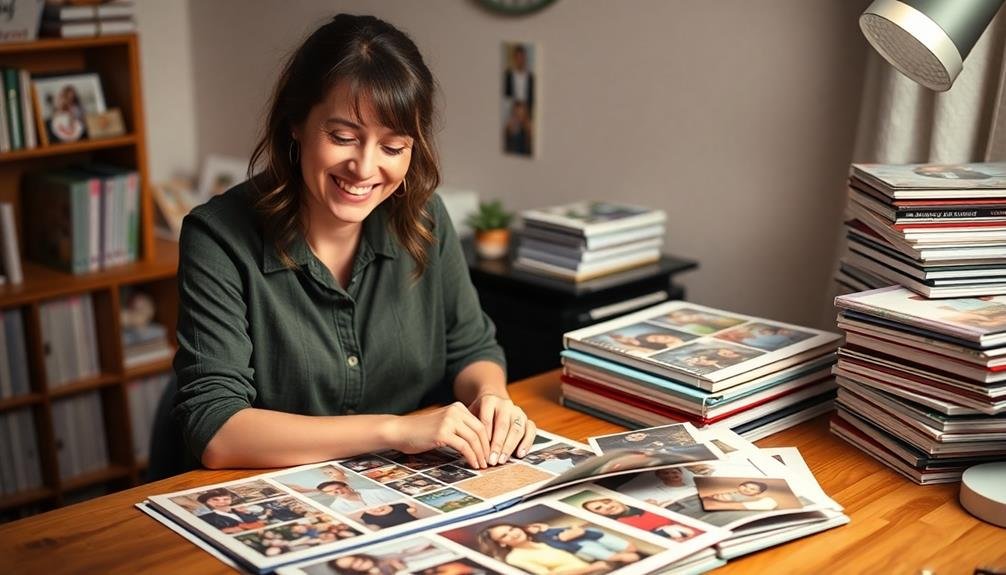
Memory keeping offers three key ways to cultivate a sense of accomplishment and purpose. When you engage in this hobby, you're actively creating a tangible record of your life experiences. This process allows you to reflect on your journey, recognize personal growth, and appreciate the milestones you've achieved.
As you compile memories, you'll find yourself:
- Developing new skills
- Preserving family history
- Creating meaningful legacies
You'll gain a sense of pride as you master various techniques, from scrapbooking to digital archiving. Each completed project represents a small victory, boosting your confidence and motivation to continue.
Memory keeping also gives you the opportunity to become the family historian. You're not just preserving memories for yourself, but for future generations.
This responsibility can provide a deep sense of purpose, knowing that your efforts will be cherished by loved ones for years to come.
Emotional Processing and Healing
Memory keeping can be a powerful tool for emotional processing and healing.
Through this hobby, you'll confront difficult past events while also celebrating positive memories, allowing you to work through complex feelings.
As you document your experiences, you'll recognize your personal growth, gaining valuable insights into your journey and fostering a sense of self-awareness.
Confronting Difficult Past Events
Confronting difficult past events can be a challenging yet essential aspect of memory keeping. As you engage with your memories, you'll inevitably encounter moments that may bring up painful emotions or unresolved issues.
However, facing these experiences head-on through your memory-keeping practice can lead to personal growth and healing.
When you confront difficult past events, you're giving yourself the opportunity to:
- Reframe negative experiences
- Gain new perspectives on past situations
- Find closure and move forward
By documenting these challenging moments, you're creating a safe space to process your emotions and thoughts.
You can use various techniques such as journaling, scrapbooking, or creating art to express your feelings about these events. This process allows you to explore your emotions without judgment and gain insights into how these experiences have shaped you.
Celebrating Positive Memories
While processing difficult memories is important, it's equally valuable to celebrate the positive ones. By focusing on joyful experiences, you're reinforcing happiness and gratitude in your life. Memory keeping allows you to revisit these moments, amplifying their positive impact on your emotional well-being.
When you document happy memories, you're creating a personal archive of joy. This collection becomes a powerful tool for boosting your mood and resilience during challenging times. You can flip through a scrapbook, scroll through digital photos, or read old journal entries to instantly reconnect with positive emotions.
Celebrating good memories also helps you appreciate the present more fully. As you reflect on past experiences, you'll likely notice patterns of what truly brings you happiness. This awareness can guide your future choices and help you cultivate more positive experiences.
Moreover, sharing these celebrated memories with loved ones strengthens bonds and creates new positive associations. Whether it's reminiscing over old photos or telling stories from the past, you're not only reliving happy moments but also creating new ones in the process.
Recognizing Personal Growth
A photograph from years ago can reveal more than just a captured moment; it can showcase your personal growth journey. As you flip through old albums or scroll through digital memories, you'll notice changes in your appearance, surroundings, and companions.
These visual cues can prompt reflection on how you've evolved emotionally and mentally over time.
Recognizing personal growth through memory keeping allows you to:
- Identify patterns in your behavior and decision-making
- Appreciate the challenges you've overcome
- Celebrate the skills and wisdom you've gained
By comparing your past self to your present, you'll gain insight into your resilience and adaptability. You might notice how you've developed better coping mechanisms, improved your relationships, or pursued new passions.
This self-awareness can boost your confidence and motivate you to continue growing.
Memory keeping also provides a tangible record of your progress, serving as a reminder during tough times that you're capable of change and improvement.
It's a powerful tool for emotional processing and healing, allowing you to confront past struggles and acknowledge how far you've come.
Distraction From Anxious Thoughts
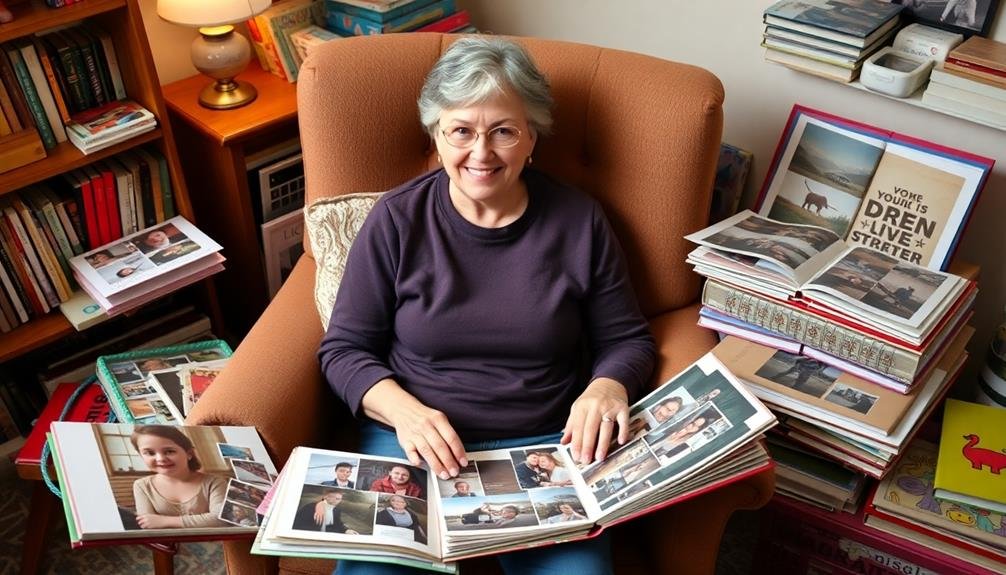
When anxiety creeps in, memory keeping can offer a powerful distraction.
You'll find solace in focusing on positive memories, allowing your mind to shift away from worries and onto cherished moments.
As you engage in mindful creative expression and immerse yourself in the present task of preserving memories, you'll create a mental sanctuary that helps keep anxious thoughts at bay.
Focus on Positive Memories
Delving into positive memories can serve as a powerful antidote to anxious thoughts. When you engage in memory keeping, you're naturally drawn to reflect on joyful moments, accomplishments, and cherished experiences. This process shifts your focus away from worries and onto the positive aspects of your life, effectively rewiring your brain to prioritize happiness over stress.
As you sift through photos, mementos, and journal entries, you're actively reinforcing neural pathways associated with positive emotions. This practice can help build resilience against future stressors and improve your overall mood.
By consciously choosing to highlight and preserve happy memories, you're creating a personal archive of positivity that you can turn to whenever you need a mental boost.
Consider these benefits of focusing on positive memories:
- Increased production of feel-good hormones like serotonin and dopamine
- Enhanced ability to cope with current challenges by recalling past successes
- Improved self-esteem and confidence through reflection on personal growth
Mindful Creative Expression
Engaging in mindful creative expression through memory keeping offers a powerful distraction from anxious thoughts. As you focus on crafting your memories, you'll find yourself immersed in the creative process, giving your mind a break from worries and stress. This form of artistic expression allows you to channel your energy into something positive and tangible.
When you're working on a scrapbook page, photo album, or journal entry, you're fully present in the moment. You're choosing colors, arranging elements, and deciding how to tell your story. This level of concentration naturally pushes anxious thoughts to the background.
The tactile nature of memory keeping – touching papers, photos, and embellishments – can also be grounding and calming.
Moreover, the act of creating something beautiful from your memories can boost your mood and self-esteem. You're not just preserving memories; you're crafting a personal work of art. This sense of accomplishment can counteract negative thought patterns and provide a sense of control over your experiences.
Present-Moment Immersion
Memory keeping serves as a powerful portal to the present moment, drawing you away from anxious thoughts and into a world of creativity and reflection.
As you engage in this hobby, you'll find yourself fully immersed in the task at hand, whether it's arranging photos, journaling, or crafting scrapbook layouts. This focus on the present helps quiet the mind and reduce stress.
The act of memory keeping encourages you to:
- Concentrate on sensory details, like the texture of paper or the scent of glue
- Engage in mindful decision-making as you choose colors, layouts, and embellishments
- Practice gratitude by reflecting on positive memories and experiences
Self-Discovery Through Personal Narratives
Personal storytelling serves as a powerful tool for self-discovery in memory keeping. As you craft your narrative, you'll uncover hidden patterns, emotions, and insights about yourself. This process allows you to reflect on your experiences, helping you gain a deeper understanding of your values, motivations, and personal growth over time.
When you engage in memory keeping through personal narratives, you're not just documenting events; you're actively shaping your identity. You'll find yourself exploring different aspects of your personality and examining how various life events have influenced your choices and perspectives.
| Benefits of Self-Discovery | Techniques to Explore |
|---|---|
| Increased self-awareness | Journaling |
| Improved decision-making | Photo storytelling |
| Enhanced emotional intelligence | Mind mapping |
Frequently Asked Questions
How Much Time Should I Dedicate to Memory Keeping Each Week?
You should dedicate as much time as you're comfortable with for memory keeping. Start with 30 minutes to an hour weekly. It's not about quantity but consistency. Adjust based on your schedule and enjoyment of the activity.
What Are the Best Tools and Materials for Beginners?
For beginners, you'll want simple tools: a journal, acid-free pens, and photo-safe adhesives. Start with a basic scrapbook kit, including decorative papers and stickers. Don't forget a good camera or smartphone for capturing memories. Keep it simple and enjoyable!
Can Digital Memory Keeping Be as Effective as Physical Scrapbooking?
Yes, digital memory keeping can be just as effective as physical scrapbooking. You'll find it's convenient, easily shareable, and space-saving. It allows you to edit, backup, and access your memories from anywhere. Choose whichever method you enjoy most.
How Do I Involve Family Members in My Memory Keeping Projects?
You can involve family members by asking them to contribute photos, write stories, or help design layouts. Plan group crafting sessions, create shared digital albums, and assign specific roles like archiving or journaling to make it a collaborative effort.
Are There Any Potential Drawbacks or Risks to Memory Keeping?
While memory keeping can be rewarding, you'll face potential drawbacks. It's time-consuming, may trigger negative emotions, and could lead to hoarding tendencies. You might also struggle with privacy concerns or feel pressure to constantly document experiences.
In Summary
You've discovered that memory keeping is more than just preserving the past; it's a powerful tool for managing stress and nurturing your well-being. By engaging in this creative hobby, you're giving yourself a chance to relax, reflect, and find meaning in your experiences. Whether you're scrapbooking, journaling, or organizing photos, you're creating a positive focus that can help you process emotions and reduce anxiety. Embrace memory keeping as your personal stress-relief strategy.

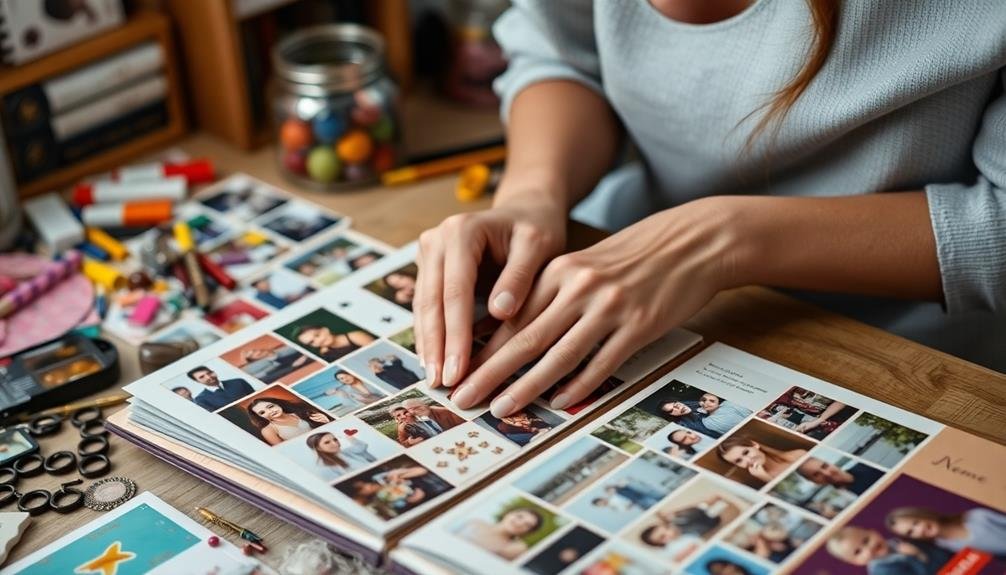
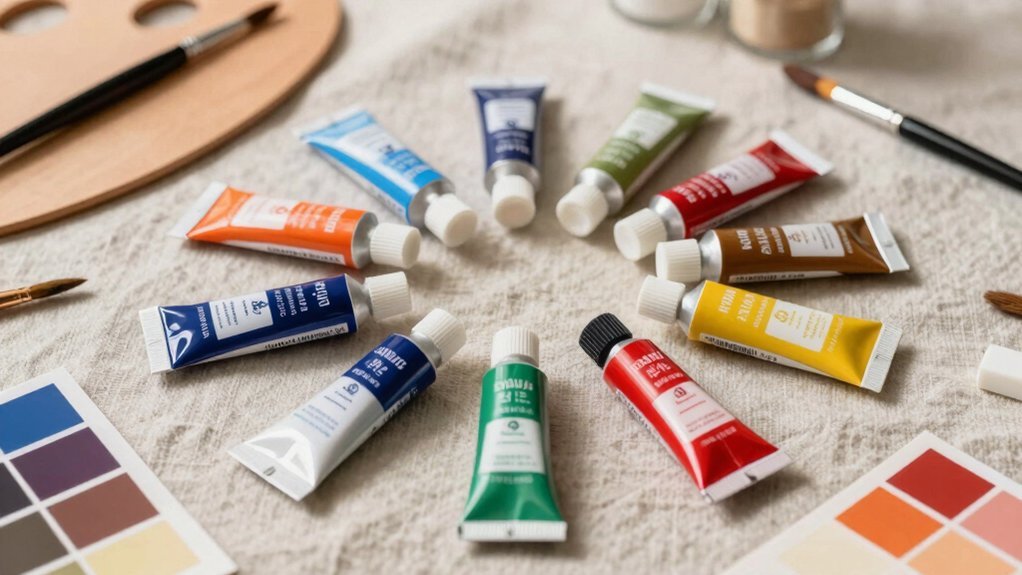
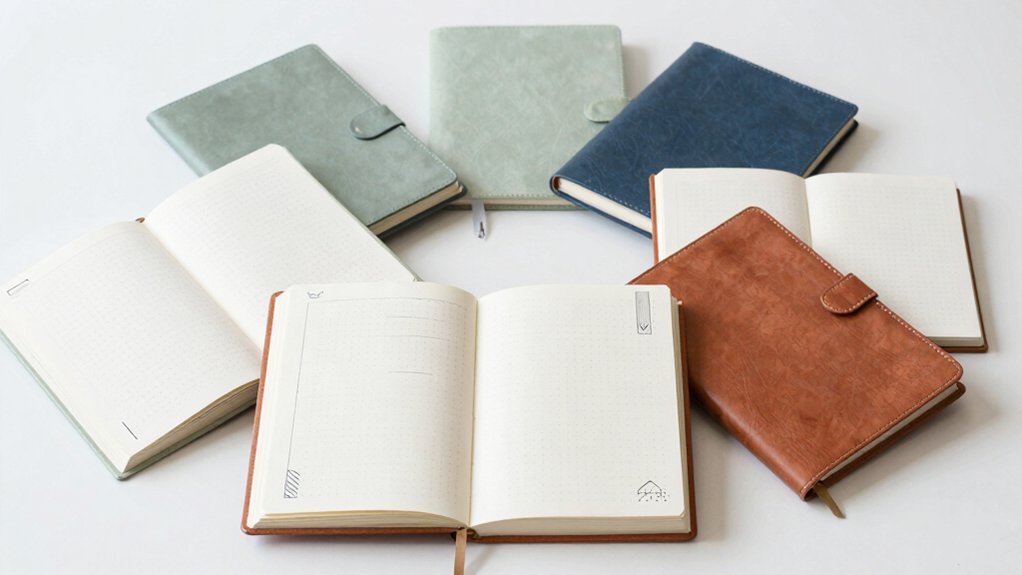
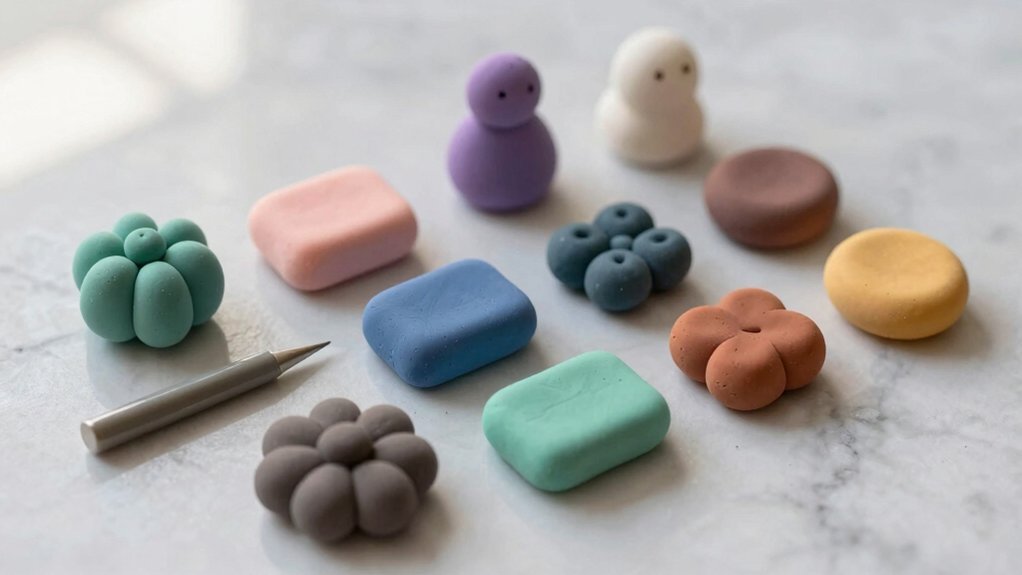
Leave a Reply